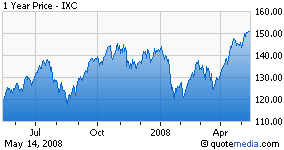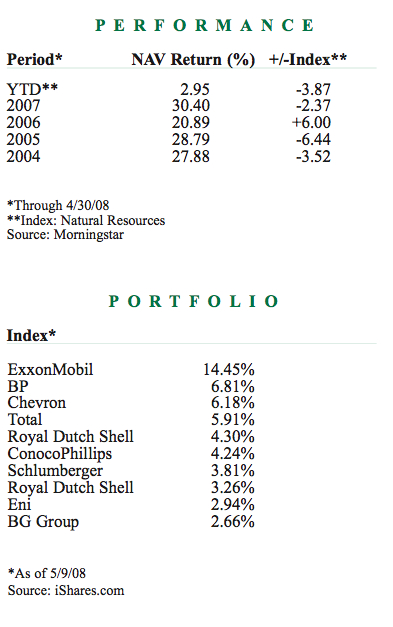For much of this past year, iShares S&P Global Energy ETF (IXC) has lagged the three other energy-focused iShares ETFs, both in performance and on our ETF Momentum Tracker Sector Momentum Table.
IXC currently sits in the 10th spot and has fluctuated between No. 9 and No. 13 in the last three months, while iShares Dow Jones Oil & Gas Exploration (IEO), Oil Equipment (IEZ) and Energy (IYE) sit in the top six.
 Of course, IXC has by no means been left out of the energy sector’s long run-up; its global construction—nearly half its assets are in foreign stocks, and it strongly emphasizes typically more stable, giant-cap stocks—means it could maintain momentum if foreign stocks take the lead from their U.S. counterparts.
Of course, IXC has by no means been left out of the energy sector’s long run-up; its global construction—nearly half its assets are in foreign stocks, and it strongly emphasizes typically more stable, giant-cap stocks—means it could maintain momentum if foreign stocks take the lead from their U.S. counterparts.
With BP (BP), Total (TOT), Royal Dutch Shell (RDS.A), Eni (E), BG Group (BRGYY.PK), Petrobras (PBR) and EnCana (ECA) among its top 12 holdings, IXC stands apart from the typical energy fund. In fact, though ExxonMobil (XOM)—whose stock has struggled recently (down 5.6% year to date through March 9) because of sky-high expectations—is the longtime and recent top holding, it accounts for less than 15% of assets, compared to 21.4% for Dow Jones Energy. Add in Chevron (CVX), which accounts for 14.6%, and 36% of IYE’s assets are in two stocks.
Recently, with investments in two share classes, Royal Dutch Shell was actually IXC’s second-largest holding, at about 7.5% of holdings. In late April, Shell and BP reported “forecast-busting” earnings, according to Reuters. Shell shares are up 11% in the last month, while nominal IXC No. 2 holding BP is up 12.5%. The fund recently boasted an average market capitalization of $104 billion, with nearly three-quarters of assets in stocks described by Morningstar as giant-cap and nearly 98% classified as giant- or large-cap. That weighting makes the fund a bit less volatile than its peers, though its three-year standard deviation of 19.84 more than doubles that of the S&P 500.
The fact that the iShares Dow Jones funds have outperformed this year (Energy is up 7.0% year to date, Oil & Gas Equipment gained 14.2%, and Oil & Gas Exploration added 19.9%, all through May 9) could indicate that IXC has more room to run.
Morningstar analyst Emiko Kurotsu wrote last month that the company covers about 66% of IXC’s assets and found that, on average, those stocks are trading at a 6% discount. By contrast, on May 9, Dow Jones Oil & Gas Exploration traded at a 2.3% discount, according to Morningstar.
Because of our exposure to natural resources funds through the iShares GSCI Commodity-Indexed Trust (GSG) and Dow Jones Basic Materials (IYM), we currently don’t hold any of the energy-focused ETFs in our ETF Momentum Tracker portfolio.
One of the things that makes those broader funds more attractive than this one—and the other energy-focused funds—is that while GSG and IYM offer exposure to oil, they’re more diversified and therefore not tied solely to oil prices.
Energy funds tend to move up and down with oil prices, which explains their laudable returns in recent years, as oil prices quadrupled. The iShares energy ETFs have posted an average one-year gain of 35.7%, but GSG is up 66.7% over that period.
U.S. crude hit a new record high of $126.27 per barrel on Friday, and last week brought a wave of predictions that it could hit $200 in the coming months. At the same time, the dollar strengthened a bit, leading Edward Meir of MF Global to note that the sector appeared overbought and prone to a short-term correction. Meanwhile, others posited that oil could just as likely fall to $80, which would likely have a negative impact on energy funds.
Last week’s rising prices brought forth speculation that OPEC may increase supply by this fall, in the hopes of keeping markets “orderly,” according to Bloomberg.
Finally, political moves to reduce the cost of gasoline and other oil products could have an adverse impact on the price or at least the perception of energy stocks. Last week, U.S. Senate Democrats unveiled a new energy package that threatens to revoke $17 billion in tax breaks for energy firms and would place a 25% windfall tax on firms not invest- ing enough in new energy sources.
After the long run-up, such a move could be painful for energy fund shareholders. Of course, geopolitical events in any number of countries could send oil prices skyrocketing, and quickly. In the end, the only sure thing is that oil prices will remain unpredictable, as they have for decades. Energy funds will likely move with them, and that volatility makes IXC both worth watching and possibly worth avoiding.





